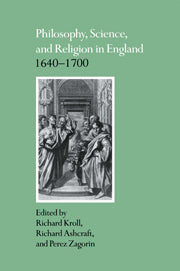Freshly Printed - allow 6 days lead
Couldn't load pickup availability
Philosophy, Science, and Religion in England 1640–1700
This interdisciplinary collection of essays looks at the distinctively English intellectual, social and political phenomenon of Latitudinarianism.
Richard Kroll (Edited by), Richard Ashcraft (Edited by), Perez Zagorin (Edited by)
9780521410953, Cambridge University Press
Hardback, published 31 January 1992
304 pages
23.3 x 15.4 x 2.7 cm, 0.62 kg
This collection of essays looks at the distinctively English intellectual, social and political phenomenon of Latitudinarianism, which emerged during the Civil War and Interregnum and came into its own after the Restoration, becoming a virtual orthodoxy after 1688. Dividing into two parts, it first examines the importance of the Cambridge Platonists, who sought to embrace the newest philosophical and scientific movements within Church of England orthodoxy, and then moves into the later seventeenth century, from the Restoration onwards, culminating in essays on the philosopher John Locke. These contributions establish a firmly interdisciplinary basis for the subject, while collectively gravitating towards the importance of discourse and language as the medium for cultural exchange. The variety of approaches serves to illuminate the cultural indeterminacy of the period, in which inherited models and vocabularies were forced to undergo revisions, coinciding with the formation of many cultural institutions still governing English society.
Preface
1. Introduction Richard Kroll
Part I. The Cambridge Platonists: Philosophy at Mid-Century: 2. Henry More, the Kabbalah, and the Quakers Alison P. Coudert
3. Edward Stillingfleet, Henry More, and the decline of Moses Atticus: a note on seventeenth-century Anglican apologetics Sarah Hutton
4. Latitudinarians, Neoplatonists, and the Ancient Wisdom Joseph M. Levine
5. Cudworth, More and the mechanical analogy Alan Gabbey
6. Cudworth and Hobbes on is and ought Perez Zagorin
Part II. The Restoration Settlement: 7. Latitudinarianism and toleration: Historical myth versus political history Richard Ashcraft
8. The intellectual sources of Robert Boyle's philosophy of nature: Gassendi's voluntariam, and Boyle's physico-theological project Margaret J. Osler
9. Latitudinarianism and the 'ideology' of the early Royal Society: Thomas Sprat's History of the Royal Society (1667) reconsidered Michael Hunter
10. Locke and the latitude-men: ignorance as a ground of toleration G. A. J. Rogers
11. John Locke and Latitudinarianism John Marshall
Notes on contributors
Index.
Subject Areas: Literary studies: c 1500 to c 1800 [DSBD]


